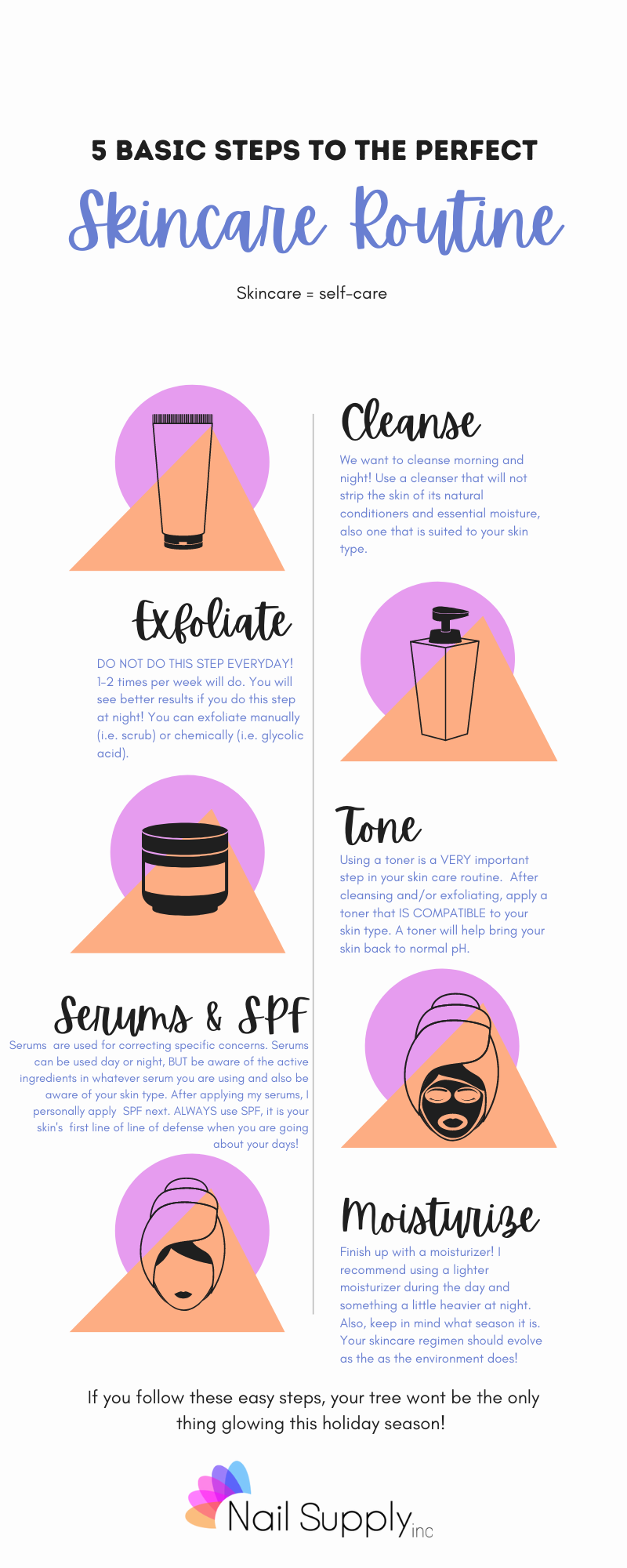Exfoliating before cleansing is recommended as it allows the exfoliant to remove dead skin cells, excess oil, and impurities before the cleanser washes them away, along with makeup and bacteria. However, using both exfoliant and cleanser together may strip the skin of moisture.

Credit: nailsupplyinc.com
Benefits Of Exfoliating
Exfoliating before cleansing offers multiple benefits. It helps remove dead skin cells, excess oil, and impurities, allowing the cleanser to deeply cleanse the skin and wash away makeup and acne-causing bacteria. However, using both exfoliation and cleansing can potentially strip the skin of moisture, so it's important to find a gentle balance.
Removing Dead Skin Cells
One of the main benefits of exfoliating is removing dead skin cells from the surface of your skin. This build-up of dead cells can make your skin look dull and uneven, and can also clog your pores. By gently exfoliating, you can slough off these dead skin cells, revealing a fresher and brighter complexion beneath.
Unclogging Pores
Clogged pores can lead to a variety of skin issues, including acne and blackheads. Exfoliating can help to unclog your pores by removing dirt, oil, and other impurities that can become trapped inside. This can help to minimize breakouts and keep your skin looking healthy and clear.
Improving Skin Texture
Exfoliating regularly can also improve the overall texture of your skin. By removing dead skin cells and unclogging your pores, you can achieve a smoother and more even skin surface. This can help to minimize the appearance of fine lines, wrinkles, and rough patches, leaving your skin soft and supple.
Pros And Cons Of Cleansing Before Exfoliating
Cleansing before exfoliating allows chemical exfoliants to penetrate deep into the skin and prevent makeup or dirt from pushing deeper. However, using a gentle cleanser or exfoliant alone should remove makeup and dirt without stripping the skin of moisture.
Allowing Deeper Penetration Of Exfoliants
When you exfoliate before cleansing, you are lifting the dead skin cells, excess oil, and impurities away from your skin. This process allows the exfoliating agents to penetrate deeper into the skin, effectively removing these surface-level impurities. By allowing deeper penetration, exfoliating before cleansing can lead to a more thorough and effective exfoliation.
Preventing Makeup And Dirt From Pushing Deeper
Using a gentle cleanser before exfoliating can help prevent makeup and dirt from pushing deeper into your pores. Cleansing removes the outer layer of dirt and makeup, creating a clean surface for exfoliation. This can help prevent clogged pores and breakouts, making your exfoliating routine more effective in maintaining clear and healthy skin.
Potential Risk Of Stripping The Skin Of Moisture
While cleansing before exfoliation can have its benefits, it's important to be cautious of stripping the skin of moisture. Using both a cleanser and an exfoliant together may be too harsh for some skin types, leading to dryness and irritation. If you have sensitive or dry skin, it may be best to choose either cleansing or exfoliating, depending on your skincare needs.
Overall, the decision to cleanse before or after exfoliating depends on individual preferences and skin types. It's essential to find a balance that works best for your skin and avoids any potential risks. Consider experimenting with different routines to find what gives you the desired results and maintains the health of your skin.
Pros And Cons Of Exfoliating Before Cleansing
When it comes to skincare routines, exfoliation and cleansing are two essential steps. One common question that arises is whether to exfoliate before or after cleansing. Both approaches have their pros and cons, and in this article, we will explore the benefits and drawbacks of exfoliating before cleansing."
Lifting Away Dead Skin Cells, Excess Oil, And Impurities
Exfoliating before cleansing can be beneficial as it helps to lift away dead skin cells, excess oil, and impurities from the surface of the skin. This can leave the skin feeling smoother and looking more radiant. By removing these unwanted elements, the cleanser that follows can penetrate deeper into the skin, allowing it to be more effective.
Aiding In The Removal Of Makeup And Acne-causing Bacteria
Another advantage of exfoliating before cleansing is that it aids in the removal of makeup and acne-causing bacteria. Exfoliation helps to break down any makeup residue that may be left on the skin, making it easier for the cleanser to remove. Additionally, by removing bacteria from the skin's surface, exfoliation can help reduce the likelihood of acne breakouts.
Potential Risk Of Over-exfoliation
While exfoliating before cleansing has its benefits, it is essential to be aware of the potential risk of over-exfoliation. Over-exfoliating can lead to skin irritation, dryness, and even damage to the skin barrier. It is crucial to choose a gentle exfoliant and use it according to the recommended frequency to avoid overdoing it.
Overall, exfoliating before cleansing has the advantages of lifting away dead skin cells, excess oil, and impurities, as well as aiding in the removal of makeup and acne-causing bacteria. However, it is important to be cautious not to over-exfoliate, as this can have negative effects on the skin. Finding the right balance and incorporating exfoliation and cleansing into your skincare routine can help maintain a healthy and glowing complexion.

Credit: community.sephora.com
Best Practices For Exfoliating And Cleansing
When it comes to your skincare routine, exfoliating and cleansing play crucial roles in maintaining a healthy and radiant complexion. However, it's important to follow certain best practices to ensure you get the most out of these steps without causing any harm to your skin. In this article, we will explore the best practices for exfoliating and cleansing, focusing on using a gentle cleanser or exfoliant alone, using both cleanser and exfoliant sparingly, and considering individual skin type and sensitivity.
Using A Gentle Cleanser Or Exfoliant Alone
Before diving into the debate of whether to exfoliate before or after cleansing, it's important to understand that using a gentle cleanser or exfoliant alone can effectively remove makeup and dirt from your face. This step can help unclog pores, remove impurities, and leave your skin feeling fresh and clean.
Using a gentle cleanser or exfoliant alone is a great option, especially if you have sensitive or dry skin. It eliminates the risk of over-exfoliation and ensures that your skin's natural moisture is preserved. Look for a cleanser or exfoliant specifically formulated for your skin type, and follow the instructions on the product packaging for best results.
Using Both Cleanser And Exfoliant Sparingly
While using a cleanser or exfoliant alone can be sufficient for your skincare routine, some individuals may choose to incorporate both steps. If you decide to use both, it's crucial to do so sparingly.
Using a cleanser and exfoliant simultaneously can potentially strip your skin of its natural oils, leading to dryness and irritation. To prevent this, consider using a gentle cleanser and exfoliant no more than twice a week. This allows your skin enough time to recover, while still reaping the benefits of exfoliation and cleansing.
Considering Individual Skin Type And Sensitivity
When it comes to skincare, one size does not fit all. Each person has a unique skin type and sensitivity level, so it's important to consider these factors when deciding on the best practices for exfoliating and cleansing.
If you have oily or acne-prone skin, you may benefit from exfoliating more frequently, as it can help remove excess oil and unclog pores. However, individuals with dry or sensitive skin should opt for gentler exfoliation methods and limit the frequency to prevent irritation.
Always listen to your skin and adjust your exfoliating and cleansing routine accordingly. If you notice any redness, irritation, or discomfort, scale back on the frequency or intensity of these steps. Consulting with a dermatologist can also provide personalized guidance based on your skin's specific needs.
In conclusion, following these best practices for exfoliating and cleansing can help you achieve a healthier and more radiant complexion. Remember to use a gentle cleanser or exfoliant alone, use both cleanser and exfoliant sparingly, and consider your individual skin type and sensitivity. By incorporating these practices into your skincare routine, you can maintain a balanced and healthy complexion.
Credit: www.quora.com
Frequently Asked Questions On Do You Exfoliate Before Or After Cleansing
Should I Use Cleanser Or Exfoliate First?
Exfoliate before cleansing. This allows the exfoliant to penetrate the skin and remove dirt and makeup. However, using both may strip the skin of moisture.
Is It Better To Exfoliate Before Or After?
It is better to exfoliate before cleansing. Exfoliating first helps lift away dead skin cells, excess oil, and impurities from the skin. Cleansing afterwards helps to wash away these impurities, along with makeup and acne-causing bacteria. However, using both may strip the skin of moisture, so it's important to be gentle.
Should You Exfoliate Before Or After Cleansing Body?
Exfoliate after cleansing for optimal results. Cleansing first removes dirt and makeup, allowing exfoliants to penetrate deeply. Using both may strip moisture from the skin. For the body, exfoliate after showering when the skin is clean and damp. Incorporate face scrub 1-2 times a week for a healthy complexion.
Conclusion
To achieve the best results, it is recommended to exfoliate before cleansing your face. By doing so, you can remove dead skin cells, excess oil, and impurities from the surface of your skin. This allows the cleanser to effectively wash away these particles along with any makeup or acne-causing bacteria.
However, it is important to note that using both an exfoliator and a cleanser may lead to dryness, so it's important to find a balance that works for your skin. Incorporating exfoliation into your skincare routine can leave you with a healthy and radiant complexion.

![Best Balmorex Pro Reviews [2024]- Really Pain Relief Cream? Real User Responses](https://blogger.googleusercontent.com/img/b/R29vZ2xl/AVvXsEgsdoZctPouCeYKvyp0Lba87iq5C0fz5bbKG3-AAunxLojVrlJ2cbb4lY4UDNej92XLnl400W6WFyQ7wkLCQE4rjj-oelR4tubtaI7MUtFvopUKhJHsCuBzqJMLcAZ_KZjYk6E-FcCncMIcn3JH9ND-nAECesovMfaPdz3X7sqCnUhgiwXxAyLHIACD98Mb/w72-h72-p-k-no-nu/Special%20Balmorex%20Pro%20Reviews%20%5B2024%5D-%20Really%20Pain%20Relief%20Cream%20Real%20User%20Responses.webp)




0 Comments